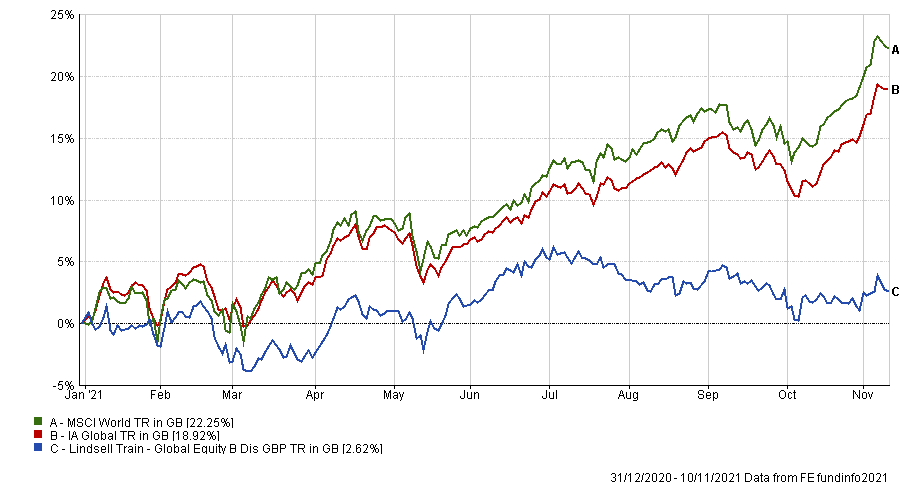Short-term price moves have left veteran fund manager Nick Train “affronted by the injustice of it all” after his LF Lindsell Train UK Equity fund posted a 0.4% loss in October.
This year has been a struggle for the fund, which is on course to underperform both the FTSE All Share index and its average IA UK All Companies peer for the first calendar year in the past decade.
Since 2011, the fund has only underperformed the benchmark once – in 2016 – but still beat its sector, as the below chart shows.
Performance of fund vs sector and benchmark over 10yrs

Source: FE Analytics
Its 11.1% gain in 2021 is 5.1 percentage points below its average peer’s 16.2% return, and 6.2 percentage points behind the benchmark (17.3%).
The “most frustrating” performer in October was the London Stock Exchange. Shares fell 5% last month after its third-quarter report, although it contained little that the manager thought was negative.
“In the short-term, prices can be driven by random or irrelevant factors that turn out to have little bearing on the long-term value of a company,” Train said.
“Like most investors, though, I find it hard not to respond emotionally to short-term price moves. When our stocks go up, I feel all is right with the world and I applaud the good sense of the buyers. Contrarily, when they fall, I am affronted by the injustice of it all. In October, I experienced both emotional states.”
The fund was also hit by a 2% fall in the shares of Unilever. The firm, known for consumer brands such as Marmite and Dove, struggled as the third-quarter report came out.
“Things could have been even worse, however, as at one point the stock was down more than 5% in October as investors braced themselves for the report,” said Train, adding it turned out not to be as bad as first feared.
Unilever has “uniquely high exposure” to emerging markets, which has been a problem as growth has been slow, but the manager said that the firm is building for the future by entering into new partnerships across plant-based proteins and biotechnology cleaning products, and has increased its quarterly dividend by 4%.
“Who is to say this company won’t be able to sustain that rate of underlying cash-return growth to shareholders, with these and other initiatives? It has done so for over half a century,” Train said.
There was also positive news. RELX rose 5% while Experian was up 8% and Burberry and Hargreaves Lansdown gained 6% and 7%, respectively. Heineken too had a better month, up 4%.
It is a similar story for the Lindsell Train Global Equity fund, which is in danger of failing to beat the MSCI World benchmark and its average IA Global peer for the third year in a row.
So far in 2021, the fund has made just 2.6% compared with a 19% rise for its average rival and 22.5% for the MSCI World.
Performance of fund vs sector and benchmark in 2021

Source: FE Analytics
In October the portfolio lost 1.6% while the benchmark index rose 4% as co-manager Michael Lindsell said the trend of its underperformance “was reinforced with a vengeance”.
He noted that the poor returns were due to strong gains for big tech companies, of which the fund has very little exposure, as well as the rise in commodity prices, which boosted energy companies – where the portfolio has no holdings.
“We are concentrated on areas that are not participating as much as we would like in this bull market, while that same bull market is creating ever greater concentration in the benchmarks, too,” he said.
Large technology stocks now account for 20% of the global market capitalisation, he said. However, this presents its own risks.
“Should we alter the portfolio at this juncture? The clear answer to us is no – we cannot believe we would be doing our clients a favour if we did so,” said Lindsell.
“Of course, we greatly admire some Big Tech stocks (although others will never generate the cash flows to justify current valuations) and a handful of them sit in our wider universe under regular review. But for now – and following this period of extraordinary performance divergence – we are happy with our current portfolio.”
Of the three technology stocks the portfolio does own, Paypal fell 11% in October amid rumours it was interested in acquiring Pinterest, although eBay and Intuit rose 10% and 16% respectively.
Lindsell said the portfolio was also full of companies that are not labelled as tech, but where innovation will be key to their future.
Disney, Japan Exchange Group, RELX, the LSE and Nintendo all fit this brief, but all have struggled this year.
“Overall, the 36% of the portfolio invested in media content and data owners has generated a total weighted return of just 8% since the beginning of 2020. And this has been a major factor in our 2021 underperformance,” Lindsell said.
“We continue to believe that the gap in performance is unjustified and that our portfolio, illustrated by several of the investments discussed above, offers considerable opportunity for further share price appreciation.”





